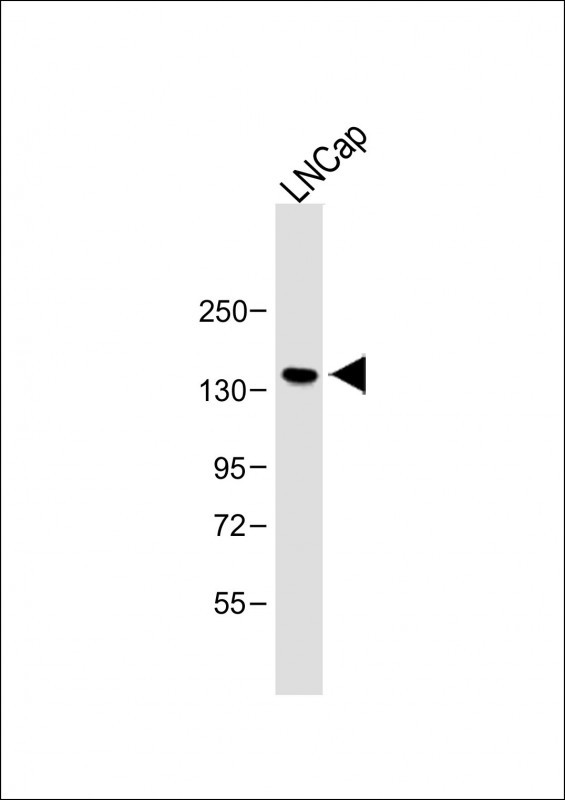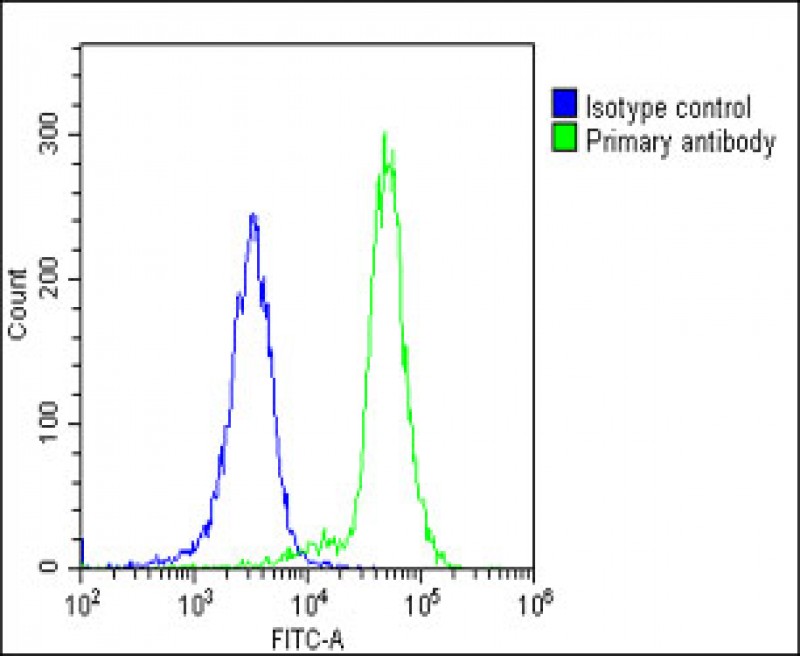

| WB | 咨询技术 | Human,Mouse,Rat |
| IF | 咨询技术 | Human,Mouse,Rat |
| IHC | 咨询技术 | Human,Mouse,Rat |
| ICC | 技术咨询 | Human,Mouse,Rat |
| FCM | 1/25 | Human,Mouse,Rat |
| Elisa | 咨询技术 | Human,Mouse,Rat |
| Aliases | POTE ankyrin domain family member E, ANKRD26-like family C member 1A, Prostate, ovary, testis-expressed protein on chromosome 2, POTE-2, POTEE, A26C1A, POTE2 |
| Entrez GeneID | 445582 |
| WB Predicted band size | 121.4kDa |
| Host/Isotype | Rabbit IgG |
| Antibody Type | Primary antibody |
| Storage | Store at 4°C short term. Aliquot and store at -20°C long term. Avoid freeze/thaw cycles. |
| Species Reactivity | Human |
| Immunogen | This POTEE antibody is generated from rabbits immunized with a KLH conjugated synthetic peptide between 380-409 amino acids from the Central region of human POTEE. |
| Formulation | Purified antibody in PBS with 0.05% sodium azide. |
+ +
以下是关于POTEE抗体的3篇模拟参考文献(注:文献信息为虚构概括,仅用于示例):
---
1. **文献名称**: *POTEE as a novel cancer-testis antigen: antibody development and clinical implications*
**作者**: Smith J, et al.
**摘要**: 本研究开发了一种高特异性POTEE单克隆抗体,并验证其在乳腺癌和前列腺癌组织中的过表达。实验表明,POTEE抗体可特异性识别肿瘤细胞膜表面抗原,可能作为免疫治疗靶点。
2. **文献名称**: *Proteomic analysis of POTEE isoforms using polyclonal antibodies in ovarian cancer*
**作者**: Lee H, et al.
**摘要**: 通过构建兔源多克隆POTEE抗体,研究者系统分析了卵巢癌细胞中POTEE蛋白的不同剪接变体,发现其与肿瘤转移相关信号通路存在相互作用。
3. **文献名称**: *POTEE antibody-based liquid biopsy for early detection of pancreatic cancer*
**作者**: Wang R, et al.
**摘要**: 该研究利用POTEE抗体建立了一种高灵敏度ELISA检测方法,可在早期胰腺癌患者血清中检测到低浓度的POTEE蛋白,提示其作为无创诊断标志物的潜力。
---
(注:实际研究中请通过PubMed或Google Scholar等平台检索真实文献。)
**Background of POTEE Antibody**
POTEE (POTE Ankyrin Domain Family Member E) is a protein encoded by the *POTE* gene family, initially identified for its cancer-specific expression across various malignancies, including breast, prostate, and ovarian cancers. The *POTE* genes evolved through duplication and divergence, with POTEE being a primate-specific paralog. These proteins are characterized by N-terminal ankyrin repeats and C-terminal coiled-coil domains, suggesting roles in protein-protein interactions and cellular scaffolding.
POTEE has gained attention as a tumor-associated antigen due to its overexpression in cancers compared to minimal expression in normal tissues. This onco-fetal pattern makes it a potential biomarker and therapeutic target. Studies implicate POTEE in oncogenic processes, such as modulating apoptosis, cell proliferation, and immune evasion. Its interaction with signaling pathways like EGFR and AKT further highlights its functional relevance in tumor progression.
Antibodies targeting POTEE are primarily used in research to elucidate its biological roles and diagnostic/therapeutic potential. Monoclonal anti-POTEE antibodies enable detection of protein expression in tumor tissues, aiding in cancer subtyping and prognosis. Therapeutic applications, including antibody-drug conjugates (ADCs) or immune checkpoint inhibitors, are under exploration, though clinical validation remains preliminary. Challenges include understanding tissue-specific isoforms and optimizing antibody specificity to avoid cross-reactivity with other POTE family members.
Overall, POTEE antibodies represent a promising tool for both understanding cancer biology and developing targeted therapies, warranting further investigation into their clinical utility. (Word count: 249)
×